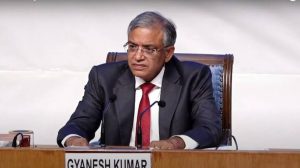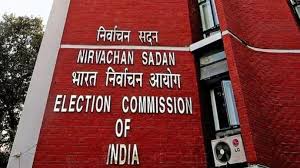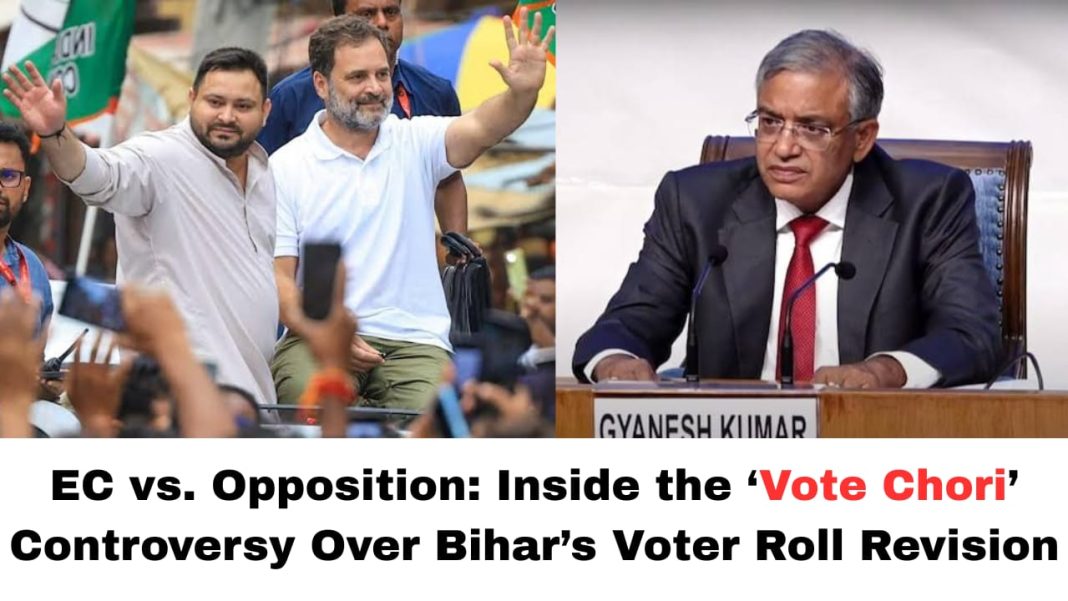Digital News Guru Bihar Desk:
A Democractic Storm: Bihar’s Voter Roll Revision and the “Vote Chori” Row
As Bihar gears up for its critical 2025 Assembly elections, the Election Commission of India (ECI)’s Special Intensive Revision (SIR) of the electoral rolls has ignited one of the fiercest political storms of the year. Opposition parties, led by Congress, accuse the ECI of orchestrating “vote chori”, or voter theft—asserting that millions of legitimate voters have been deliberately excluded. The ECI, in turn, has fiercely defended its integrity and process. With escalating tensions, the matter has reached the Supreme Court, prompting fresh scrutiny of the Commission’s procedures and transparency.
The Opposition’s Allegations
Congress leader Rahul Gandhi, at the forefront of the backlash, has characterized the SIR as a deliberate attempt to manipulate the voter list. He decried the process as a conspiracy to disenfranchise voters, particularly those from marginalized communities. Gandhi even quipped that he had “tea with voters wrongly declared dead,” lampooning the gravitas of his allegations.

Joining Gandhi, Tejashwi Yadav of the RJD accused the ECI of issuing duplicate voter ID cards (EPICs) to pro-BJP individuals and adding out-of-state voters (notably from Gujarat) into Bihar’s lists. Meanwhile, senior Congress leader P. Chidambaram raised pointed questions in Parliament: With Bihar’s population increasing, why then has the number of registered voters dropped? He challenged the ECI’s assumptions—such as 36 lakh people “permanently migrating”—as not just provocative but arbitrary.
To mobilize public sentiment, the Congress has also launched a 16-day “Voter Adhikar Yatra”, stretching 1,300 km across 20 districts and culminating in a grand rally in Patna on September 1. The campaign features prominent opposition leaders and calls for citizens to rise against what is being framed as an assault on democratic voting rights.
The EC’s Rebuttal
The ECI, led by Chief Election Commissioner Gyanesh Kumar, has responded with resolute indignation. At its first press conference since the SIR began, the body denied any bias, underlined its commitment to constitutional duty, and warned that “making allegations of vote theft is…an insult to the Constitution.”
Kumar emphasized that all political parties—ruling or opposition—are treated equally by the ECI and that the process involved diligent participation from voters, political parties, and over 10 lakh booth-level agents (BLOs). He also cited video testimonials and signed documents as part of the verification mechanism.
Addressing demands for a machine-readable voter list, Kumar differentiated it from the available searchable version, stressing that machine-readable formats could breach voter privacy as per a 2019 Supreme Court ruling. Furthermore, he dismissed allegations of double voting as baseless and insisted any complaints must be filed with sworn affidavits within seven days—or they would be considered invalid.

In strong language, the Commission also described the spread of misinformation as a grave insult to the Constitution, asserting that it “cannot discriminate among parties.”
Judicial Intervention: Supreme Court Orders Transparency
The bitter political row has drawn the attention of India’s highest court. In response to petitions challenging the SIR, the Supreme Court has issued an interim order with sweeping transparency mandates:
- The ECI must publish district-wise, booth-level lists of the 65 lakh voters deleted from the draft roll, specifying whether deletion was due to death, migration, or duplication.
- These lists must be made available online (through District and CEO websites) and physically displayed in Panchayat and Block offices, with widespread publicity via vernacular and English newspapers, radio, television, and social media.
- Voters wrongly excluded will be allowed to file objections using Aadhaar and EPIC as identity proof—documents the ECI had previously excluded.
Legal experts view the order as a crucial correction to the ECI’s initial reluctance. An editorial in The Indian Express welcomed the ruling, noting that transparency is non-negotiable, especially in exercises of this scale and political sensitivity. Similarly, analysis from NewsReel Asia criticized the ECI’s resistance to basic accountability measures—and underscored the judiciary’s role in safeguarding the public’s right to vote.

What Lies Ahead?
With the next Supreme Court hearing slated for August 22, 2025, two-track developments will shape the outcome:
| Stakeholder | Next Steps |
| Election Commission | Must comply with Court’s order, publish data, accept objections, and defend its process in court and public discourse. |
| Opposition Parties | Will use the Yatra and public heat to highlight any discrepancies and keep pressure on ECI. |
| Citizens/Voters | Can access deletion data, verify status with EPIC/Aadhaar, and seek reinstatement where applicable. |
This standoff puts the spotlight squarely on election integrity and the role of institutions in a democracy. The ECI’s willingness—or reluctance—to comply transparently may well define public confidence not only in Bihar’s elections but in electoral governance nationwide.
You May Also Read: Rajinikanth’s Coolie Smashes into U.S. Top-5 Openings for Indian Films








